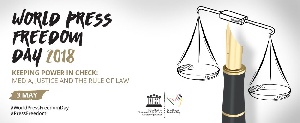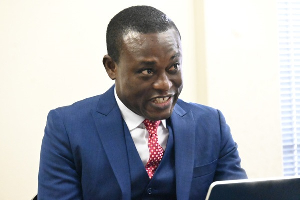Since 1993, the 3rd day of May every year has never passed without being marked by ceremony and fanfare across the globe. That Day has been designated as World Press Freedom Day (WPFD) and is meant to remind the world of a fundamental human right, namely, the right to freedom of opinion and expression. This right encompasses the freedom to hold opinions without interference, and to seek, receive and impart information and ideas through any media, regardless of frontiers.
That's why the opportunity is taken, on World Press Freedom Day, to design and promote initiatives in favour of press freedom, and to assess the current state of press freedom, globally. This is necessary because abuses or violations of this fundamental human right constantly occur: publications are censored, fined, suspended and closed down and, even more tragically, journalists, editors and publishers are harassed, attacked, detained and on occasion, even murdered.
It is also an occasion to defend the media from attacks on their independence and to pay tribute to journalists who have lost their lives in the exercise of their profession.
History of World Press Freedom Day
The General Assembly of the United Nations Organization (U.N.O.) proclaimed WPFD in 1993, following a Recommendation adopted at the twenty-sixth session of the United Nations Scientific and Cultural Organization’s (UNESCO's) General Conference in 1991. The “Windhoek Declaration” was put together at a UNESCO seminar, o the theme, "Promoting an Independent and Pluralistic African Press," held in Windhoek, Namibia, from April 29 to May 3, 1991. The Recommendation was endorsed by the UNESCO General Conference in 1993.
The Windhoek Declaration emphasises that a fully independent press is essential for achieving a successful, participatory democracy. It is a fundamental human right but often negated by the intimidation, imprisonment, and censorship of journalists across Africa.
Freedom of opinion and expression and the law
The right to freedom of opinion and expression is enshrined in Article 19 of the United Nations Universal Declaration of Human Rights of 1948) thus: "Everyone has the right to freedom of opinion and expression; this right includes freedom to hold opinions without interference and to seek, receive and impart information and ideas through any media regardless of frontiers".
This Article underlies Article 21(1) (a) of Ghana’s own 1992 Constitution, which states that “All persons shall have the right to freedom of speech and expression, which shall include freedom of the press and other media.”
A famous English jurist, Lord Denning, stated the position of freedom of the press under the law when he wrote that "The freedom of the press is extolled as one of the great bulwarks of liberty. It is entrenched in the constitutions of the world... [The press] can publish whatever it chooses to publish. But it does so at its own risk... Afterwards – after the publication – if the press had done anything unlawful, they can be dealt with by the courts... If they should damage the reputation of innocent people...they may be made liable in damages.... The press is not above the law."
One most significant elements of the law, as espoused by Lord Denning, is the rejection of what is known as prior restraint. In 1971, the Court in New York Times Co. v. United States established that freedom of the press is only present when there is no restraint on publication before dissemination.
It is such principles that make freedom of press an essential tool for acquiring knowledge and promoting the exchange of ideas and opinions in a modern democracy.
Source: G.D Zaney
Staff of Information Services Department
General News of Saturday, 14 April 2018
Source: g.d zaney













